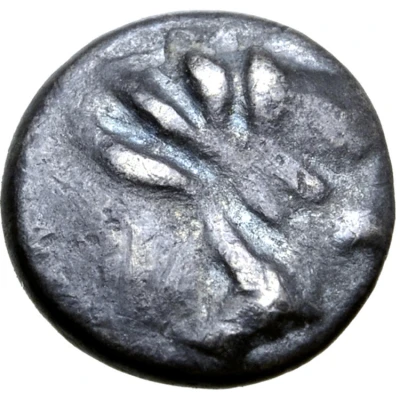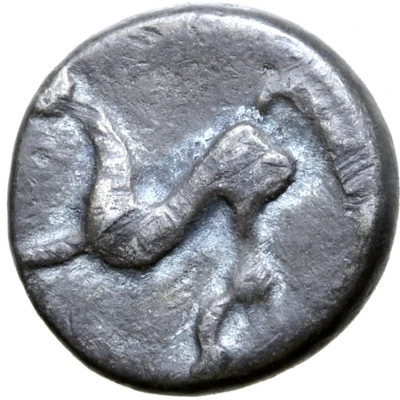


© Roma Numismatics Limited
Hemiobol Kugelwange Type 300 BC - 201 BC
| Silver | 0.35 g | 7 mm |
| Issuer | Uncertain Eastern European Celts (Uncertain Central and Eastern European Celts) |
|---|---|
| Type | Standard circulation coin |
| Years | 300 BC - 201 BC |
| Value | Hemiobol (1⁄12) |
| Currency | Drachm |
| Composition | Silver |
| Weight | 0.35 g |
| Diameter | 7 mm |
| Shape | Round (irregular) |
| Technique | Hammered |
| Orientation | Variable alignment ↺ |
| Demonetized | Yes |
| Updated | 2024-10-09 |
| Numista | N#190584 |
|---|---|
| Rarity index | 100% |
Reverse
Horse prancing to left.
Comment
Examples of this type:• Example #1 (0.35g, 7mm; Very Fine) - In main image
© Image courtesy of Roma Numismatics Limited
◦ Ex-Hermann Lanz Collection; published in Kostial #520;
◦ Auctioned by Roma Numismatics Ltd, Auction XVIII, 29 September 2019, lot 129. Sold for 40 GBP.
◦ Exhibited by the Staatlichen Münzsammlung München at the 1997 International Numismatic Congress in Berlin; at the Berliner Bank also in 1997; also exhibited at the Luitpoldblock Palmengarten, Munich in 2003 (exhibition #92[reverse]).
• Example #1 (0.36g, 8mm, 10h; Very Fine) - In main image
© Image courtesy of Roma Numismatics Limited
◦ Ex-Hermann Lanz Collection; published in Kostial #519;
◦ Exhibited by the Staatlichen Münzsammlung München at the 1997 International Numismatic Congress in Berlin; at the Berliner Bank also in 1997; also exhibited at the Luitpoldblock Palmengarten, Munich in 2003 (exhibition #92[obverse]).
◦ Auctioned by Roma Numismatics Ltd, Auction XVII, 29 March 2019, lot 131. Sold for 40 GBP.
Interesting fact
The Hemiobol coin was used by the ancient Celts in Eastern Europe during the 3rd century BC. The coin's design features a unique combination of Celtic and Greek elements, reflecting the cultural exchange and influence between the two civilizations during that time. The coin's obverse side features a stylized horse's head, while the reverse side bears a pattern of concentric circles, which is a common motif in Celtic art. This blending of cultural styles is a fascinating example of how different civilizations can influence each other's art and currency.